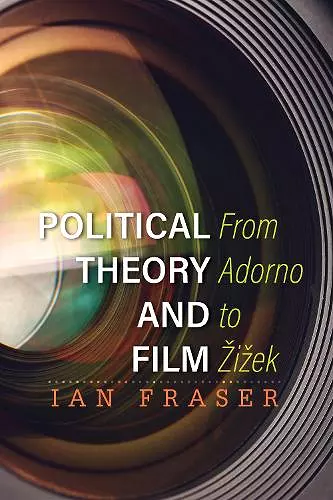Political Theory and Film
From Adorno to Žižek
Format:Paperback
Publisher:Bloomsbury Publishing PLC
Published:15th Jan '18
Currently unavailable, and unfortunately no date known when it will be back

The actions, images and stories within films can impact upon the political consciousness of viewers, enabling their audience to imagine ways of resisting the status quo, politically, economically and culturally. But what does political theory have to say about film? Should we explore film theory through a political lens? Why might individuals respond to the political within films?
This book connects the work of eight radical political theorists to eight world-renowned films and shows how the political impact of film on the aesthetic self can lead to the possibility of political resistance. Each chapter considers the work of a core thinker on film, shows its relevance in terms of a specific case study film, then highlights how these films probe political issues in a way that invites viewers to think critically about them, both within the internal logic of the film and in how that might impact externally on the way they live their lives. Examining this dialogue enables Ian Fraser to demonstrate the possibility of a political impact of films on our own consciousness and identity, and that of others.
In eight stand-alone chapters, Fraser (Loughborough, UK) summarizes the political, social, economic, and moral-psychological positions of eight Continental philosophers, pairing each with a film that best exemplifies his or her theories. All are staunch opponents of neoliberal capitalism, seeking in film a means of transforming mass consciousness as a precondition for emancipatory resistance and revolution. Though some theorists conscript philosophers from the Western canon (Kant, Hume), most anchor their primary mode of analysis in poststructuralist or neo-Marxist psychoanalytic theory (e.g., Theodor Adorno, Ernst Bloch, Alain Badiou, Jacques Rancière, Slavoj Žižek). Given the philosphers' shared political orientations and focus on culture and consciousness, the conclusions Fraser reaches at the end of each chapter are somewhat repetitive. Properly instructed to see and feel what these political theorists see and feel, the art of cinema can transform an agency of mass consumption and escapist fantasy into personal and then revolutionary political emancipation. Culture underwrites politics; like poets before them, filmmakers can become the legislators for a just society.
Summing Up: Recommended. Upper-division undergraduates through faculty.
Up to date and up to speed, Fraser’s book is an excellent introduction to the developing relationship between political theory and cinematic meaning-making. Using insights from Kant and Hume to Deleuze and Rancière, Fraser pairs major theorists with major films, working from Adorno to Žižek, from Chaplin to Chandor. Just as films make politics, so now they make political theory. -- Terrell Carver, professor of political theory, University of Bristol
Ian Fraser is one of our foremost political theorists exploring the relationships between aesthetics and politics, demonstrating how film has a powerful social significance in providing graphic and valuable exemplifications ideas and concepts developed in political philosophy. This book considers with remarkably wide-ranging agility and insight the provocative investigations of leading continental philosophers into the political imagery and radical social critique projected in such films as Chaplin's Monsiuer Verdoux, Loach's Land and Freedom and Chandor's Margin Call. -- David Boucher, Professor of Political Philosophy and International Relations, Cardiff University
Through a series of carefully chosen case studies Ian Fraser examines the relationship between cinema and political theory of (mostly left-wing) authors, such as Adorno, Benjamin, Bloch and Rancière. In a lucid way he demonstrates that films can visualise and explain ideas which are often difficult to grasp, while putting them into a test of concrete, even if fictional situations. -- Ewa Hanna Mazierska, University of Central Lancashire
Political theories have often been tied to the aesthetic weighting and visual rhetorics of the image, usefully bringing about tactics for political criticism in areas beyond the cinema. It is with this in mind that political theory has benefitted from film theory, and vice versa. Ian Fraser’s Political Theory and Film: From Adorno to Žižek seeks to add and contribute to contemporary efforts in this area.… At its best, this book introduces readers to a range of critical political theorists, who have in many cases written on or about film and shows the significance of their ideas for a critical interpretation of film; moreover, the book demonstrates how film criticism contributes to the exposition of core ideas in political theory. It is therefore quite accessible and helpful from a pedagogical standpoint. * Contemporary Political Theo
ISBN: 9781783481644
Dimensions: 231mm x 149mm x 16mm
Weight: 313g
206 pages